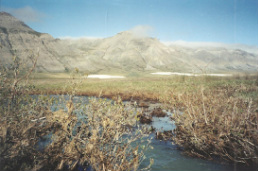 A number of years ago I had the blessing of making a trip to Alaska with my husband. We took a cruise up the Inside Passage and then had a land tour for about two weeks. At the end of the tour we added an extra day to fly to a national park above the Arctic Circle called The Gates of the Arctic. It is totally surrounded by mountains, inaccessible except by plane. Within this park is Anaktuvuk Pass, a tiny town which is seemingly cut off from the outside world. The only way in or out is by air. While the trip to Alaska was absolutely fantastic, my favorite part of it was that one day in which we were in the Park, literally in the middle of nowhere. To put this into perspective, we flew up with the morning mail delivery and flew back 8 hours later when the pilot returned for the outgoing afternoon mail. The pilot told us that if it fogged in there was no way to land a plane because of the mountains. The Brooks Range surrounds the Gates of the Arctic National Park, so a mistake could prove fatal. This is not a national park such as one would imagine. There is nothing of a commercial nature about it. There is only the little town of Anaktuvuk Pass which is inhabited by native Alaskans, the Nunamiut. We were put into the hands of an able native guide and his younger cousin who took us on a very bumpy ATV ride out onto the tundra after we had our lunch at the lone diner there. It was late June and the high temperature that day was a balmy 55 degrees. I discovered the tundra is actually incredibly alive. It looks sort of grey and dead from a distance mostly because the perma-frost keeps large plants from growing. But when we actually got out to the tundra and walked around, it was teeming with life! There were tons of itty-bitty plants; some were flowering and were imperceptible unless you got close up. It was "wall-to-wall" plant life. But what was most humbling in the entire experience was the knowledge that we were in what seemed like the middle of nowhere. This was before people had cell phones as readily as we do today, but even if we had them the odds of connection beyond the town would have been slim to none. To be out on the tundra where no one in the world from our family and friends knew where we were, was definitely humbling and a bit scary in its own way. The two young men knew where we were, but I felt a bit vulnerable. Even our plane ride out was not truly assured, though all went off without a hitch in the end. The point of all of this is that we were never in the middle of nowhere, not for a second. First, we were with the Nanamiut people, who could not have been more gracious. They were clearly living an incredibly simple life. Everything had to be airlifted in or out. It was a small town, but this was home to a couple of hundred people. While we were there only for a day, the little town seemed to open its arms to us. We were not at all in the middle of nowhere! Another reason I say we were never in the middle of nowhere is that everywhere is where God is. He never lost sight of us for a heartbeat. God was with us every moment of that exhilarating day. We were never really in any danger since the weather was picture perfect, though potentially traveling in an 8 seat airplane over treacherous mountains does have an element of danger built in. But to God we were in the center of His focus, as each one of us is every moment of every day and night. We may have felt vulnerable at some point, but there is no such thing as "the middle of nowhere" in God's creation. We were no less in His hands and in His sight than we are at any other time, on any other day, doing even the most routine of things. There are days (we all have them) when we can be at work or in our own homes and feel like we are in the middle of nowhere. We do not have to be in a remote part of Alaska to experience this feeling. We can feel disconnected from family or friends without it actually being so. We can feel like we are lost in the midst of a busy life. That is when we need to remember that God always knows where we are and does not leave us for even a heartbeat. We cannot always feel His presence. But that does not mean He is not there. One of the biggest mistakes people make in the pursuit of a spiritual life is to think that we are always supposed to feel God's presence, especially when we pray. Sometimes when people begin to pray they report that they feel God's presence. Then one day, God seems to be gone: they can no longer feel Him near. Others say they cannot feel His presence from the beginning and struggle because of this. Neither group is necessarily doing something “wrong”. Sometimes God lets us feel His presence and then when we get further developed in our prayer lives, He goes deeper, beyond our senses. It is all mystery; it is a wonderful gift and requires our faith to trust that it is so. And for those who say they have never felt His presence, I would say that maybe they were not sure where to look or what to look for. It could be a matter of our expectations. We are expecting Him to come one way, and He comes another, so we do not see or feel Him present. Just like being on the vast tundra in the Arctic Circle, where I felt small as a speck of sand, we all feel a bit like we are in the middle of nowhere sometimes, but we are not alone. Just as the tundra is teeming with life, so too, is the world around us teeming with life. Between that which is seen and that which is unseen we are in a very populous world. Some of these simply are not visible to the naked eye until we take a closer look. If we ask Him for the grace to see and hear and experience, we can indeed begin to see and experience the life all around us. God can make His presence known through the glories of nature, through the hum of the bus or train we take to and from work, in the faces of all the people we wordlessly pass each day, in the people with whom we interact, and so on. If we limit feeling God's presence to only our time of private prayer, we are missing Him in all the ways He comes throughout the day. While we sleep, He stays close. Sometimes He sends an angel to watch over us or to bring our prayer to and from Him. But we are never in the middle of nowhere. Not ever. As the Psalmist says: "O Lord, you have probed me and you know me; you know when I sit and when I stand, you understand my thoughts from afar. My journeys and my rest you scrutinize, with all my ways you are familiar." (Psalm 139:1-3) And we should never forget that sometimes we are the agent of God's presence to those around us who may be feeling like they are in the middle of nowhere at a particular time in their life. Some may be lonely, some may be nursing wounds, some may be grieving the loss of a loved one, some may be at a transitional point in their lives and do not know where to turn. We can be the life giving presence of God to them through our care and our attention. Let us pray for the openness of mind and heart to realize that we are surrounded by the presence of God. Let us ask for the grace to know that we are never really in the middle of nowhere and that God is always with us. May we let Him expand our boundaries and horizons so that we may realize His presence in our lives! May we be filled with joy in His presence! May we be God's love to those around us who feel a bit lost and are in need of His tender presence! Let us continue to meet in the middle of the Eternal Somewhere which is God's Heart. Peace! 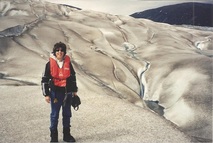 The top photo is mine. It is of the mountains in the Brooks Range from out on the tundra near Anaktuvuk Pass. Even though it was June, there was snow on the ground near the base of the mountains. The second photo was taken of me by my husband while we were on the Juneau Ice Fields where we went to walk on the glacier. This was another "middle of nowhere" experience since the only way on and off the huge glacier was by helicopter. 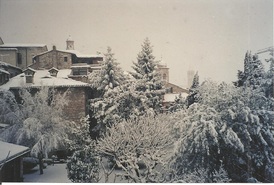 I was having lunch at a local restaurant with a friend the other day and it occurred to me what a blessing that simple event was. It was not a birthday or a milestone in either of our lives. It was not a holiday or a feast day. It was an ordinary, "garden variety" day. But indeed we were enjoying something very precious: the gift of friendship. Therefore it was a special occasion. As far as I am concerned, anytime two or more friends get together to share a bit of time is a special occasion. After all, friendship is a gift to be celebrated. In reflecting on my enjoyable lunch the other day, I realized that at least 90% of my encounters with friends involve some sort of meal. Meals are important because it is a time of nourishment. It is a time when we pause in our day, to get away from work for a moment or two, and re-focus. What better way to re-focus than with a friend! However, going to lunch with a friend is more than merely recreational or an adventure in fine dining. It is ministry. I am ministering to my friend and my friend is ministering to me. This does not mean that it is formal or that there are problems. But being a true friend to someone is a form of ministry because it is something we all need to live a life of wholeness. We need to share stories and ideas with one another, and we need to be supportive, objective, and helpful when we seek each other's advice or insights. And we need to have fun! Friendship brings joy to the heart and soul. Our friends are those people with whom we enjoy spending our precious time. It is a mutual relationship in which we can share the most difficult of times and the most joyous of times, and even better, the most ordinary of times. That is, we share the events of our lives with each other. There is nothing more important than to have people in our lives with whom we can be totally ourselves and know they still love us, or maybe they love us because we are so "real" with them. They are people who matter most to us in this world. They are more important than things or wealth or position. Friends enrich our lives in ways material things cannot. It is the love we share that gives us our greatest meaning and purpose. When God created the world, He put two people in that garden, not one. The Book of Genesis tells us that God tried to do it with only one, but Adam was lonely and none of the other creatures could satisfy his loneliness. Adam needed a partner, who was first a friend and then his spouse. For those of us who are married, our spouse is our best friend. He or she is the one with whom we share all our thoughts and dreams, and we have a common purpose in the family that we became through our union. But it does not stop there. We need to have friends outside of the family, since we are one human family. We have our civic community and especially important is the community where we worship, our faith community.  The Scriptures tell us the stories of many beautiful friendships throughout their pages. I have mentioned some of them before, but my favorite is that of Elijah and Elisha. Elijah was really at a low point when God brought Elisha into his life. Elijah wanted to die because he had successfully brought many of the people back to God, but Jezebel sought to kill him. Most of the other lesser prophets had been killed already; he was tired, depressed, and lonely, and so he wanted God to take him. God recognized what Elijah needed and so He promised that he would find a friend in a man named Elisha. After descending the mountain where Elijah met with God, he came upon Elisha who was plowing the family fields. It was as if something was recognized by both because Elisha immediately rushed home to say good bye to his parents and departed with Elijah to not only learn from him, but to be a companion. Simply put, these two like-minded men became close friends. Elijah and Elisha were so close that when it was Elijah's time to leave this world, not only did Elisha seem to know it, (okay, he was a prophet!), but he stayed with Elijah to the very end. They were so close that he was the only one to witness Elijah's miraculous passing in the fiery whirlwind. But not only that, he was intimate enough that he could ask Elijah to follow in his footsteps, to have the ability to be a prophet such as Elijah had been. Elijah knew that only God could do this, but Elisha did indeed receive his power when he saw the fiery chariot and Elijah taken into heaven. Elisha was not in this for the power; God had no doubt picked Elisha for the purpose of taking over at the appropriate time. Elisha loved his friend, so he wanted to emulate him and to honor him. He shared a deep love for the God of Israel with Elijah during their time together. This is why he received the fallen cloak of Elijah when Elijah was taken: he had the mantle of Elijah, which is to say, he had Elijah’s power. But he also had something else in that cloak. He had a precious possession which had belonged to Elijah as something to keep him close to his departed friend. He could wrap himself in that friendship as he wore that cloak. Friendship is about honoring one another. Sharing a meal is what friends do and is so central to friendship that it is what Jesus chose to do time and time again throughout His ministry. In every gospel there are numerous stories of Jesus with His friends, from the wedding at Cana to the times He was with potential followers. He even ate in the homes of people who were looked down upon because these, too, were His special friends. It should not surprise us that the night before He died He shared His last meal with His closest friends. And it should surprise us less that when He left this world He left us a meal, which is the greatest meal of all between friends: His own Body and Blood! There are lots of things He could have left us, but He chose no mere “thing.” He gave us Himself in a perpetual meal which we can receive every day if we so chose. We gather around the table as friends in Christ. We eat the bread that is His Body and we drink the wine that is His Blood and we are nourished on the love that binds us all together as the one Body of Christ. We, as the Body of Christ, should always put love first and foremost in our lives. We receive God's own love through our friends and we give God's own love to our friends in turn. Every time we sit down to a meal with our friends whether it is with the larger community of the Church at Eucharist or whether it is the smaller community of one or two friends, if love is present, He is there. Having lunch or dinner with a friend is no idle waste of time or money. It is a precious gift of love. It brings joy to our souls. As my wonderful friend Fr. John said to me the other day: “Joy is the oxygen of our soul. Without it we cannot live.” May we be filled with gratitude for the friends God has given us throughout our lives as precious gifts! May our vision of what a friend is be stretched to include the wider communities of faith to which we belong, to include the communities in which we live, and to include the stranger, the poor, the outcast and the lonely! May we always grow in our friendship with the Lord who is the most faithful friend of all! Let us continue to meet as friends in the Heart of Jesus! Peace! I took the top photo in Assisi, Italy, in December of 2001. I chose it for this entry because it reminded me of the friendship of St. Francis and St. Clare, both of Assisi. It also reminded me of a great meal and great fun I had while there with my best friend, my husband. The icon is Holy Prophet Elijah written by Rev. William Hart McNichols. It can be found at http://www.standreirublevicons.com/gallery.php?action=viewPicture&id=85 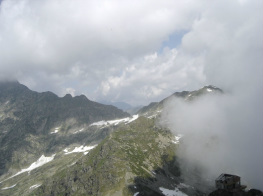 I was reading a book recently in which a main character revealed an experience which seemed incredibly unbelievable to other characters in the book. The other characters refused to believe him and in fact secretly mocked him. They had no proof that what he said was not true, but because it seemed too far-fetched to them and because it was out of the realm of possibility given their own experience, they refused to believe. The main character was frustrated by what they said and how they treated him, but he clung steadfastly to what he knew as the truth. In recent days we have seen some issues of truth in the news with situations such as allegedly fictitious relationships passed off as real, and whether or not a sports figure was honest in competition and in defense of the alleged cheating for which he is accused. So it seems to me that humans have trouble with the issue of truth sometimes. Do we believe what someone reports as truth or not? Given all the versions that are reported to us, it seems that truth is in the eye of the beholder. Or is it? I have heard someone say that there are three ways of seeing things: your way, my way, and the truth. Is truth something that is relative? Truth, by definition, cannot be relative. Part of being human means we interpret what we see and experience. That means we rely on our perceptions. We have to, given that none of us has the proverbial "crystal ball" or a hotline straight to understanding the mysteries of the universe. But simply because we perceive something to be truth does not make it so. If we decide that two plus two equals five that does not make it so. Or if we decide a neighbor does not exist, that does not make it so. Therefore there are some things that we need to accept whether we like them or not, or whether we have all the evidence or not. The word for that is faith. We do not need to accept everything we hear, nor should we. We need to rely on our perception and we need to rely upon experience. But we also have to accept that not everything is empirical and not everything can be proven. While we cannot and should not believe everything we hear or read, we have to learn to discern what may or may not be truth. To discern truth means that one needs to have a faith foundation. God is Truth and in order for us to ascertain what may be the truth, we have to first look to Him. God has left us His Word in Scripture to help us with this. He has taught us to weigh things by using the Scriptures, by providing us with those who are entrusted with interpreting them, and He has given us many graces to guide us in this life. If we weigh all things using these gifts, we can learn what is truth and hopefully what is not. St. Paul tells us that the most important gifts we have are faith, hope, and love, the greatest of the three being love. If we weigh all things through the lens of faith, hope, and love as lived and taught by Jesus Christ, how can we not stay in line with truth?  We must not forget that this does not mean we will understand everything we encounter. The other element involved in discerning truth is accepting mystery. There are some things that are just too big and too far above us to be understood in this life. God did not promise us that we would have perfect understanding. If we had this, we would not need faith, and in fact, we would have the mind of God. We all want certainty about so much in life, and this is not ours to have. But to trust in His word and to use love to help us to discern what truth is, is to have all the guidance we really need. While I hope that the real life situations I mentioned earlier would lead to truth for the people involved, I know that whatever the truth is and whatever their version may be, mine is not to judge. That is the job of the Lord. But it does teach us that honesty is the best policy, because if there are lies, they do catch up with us. Truth leads to life and deception leads to hurt for everyone involved. Jesus said, "I am the Way and the Truth and the Life." (John 14:6) It should not surprise us that truth and life are linked together. Sometimes truth can be hard to distinguish. Maybe a good spiritual director can help us to discern what the truth really is in a given situation. But if we continually turn to Jesus and ask for Him to help us to see the truth, and to leave the judging to Him, we can open our eyes to the reality of faith, hope, and love, which indeed lead us to life. The teachings of Jesus lead us to truth, and the truth involves loving. This means we try to imitate the values taught by Jesus. It also means we need to have a relationship with Him, so we can be disciples, following Him to the fullness of life and truth. He teaches us that we can pray for those who may not have been truthful and whose lack of truthfulness has led to hurt. We can pray for the victims of lies and falsehoods. And if we are the victims of lies we can pray to have forgiveness. This is the loving response to which the Gospels call us. And of course, we can pray that we have the wisdom to discern. One of my favorite prayers is known as The Serenity Prayer, by Reinhold Niebuhr, which is often only partially quoted. Here it is in its entirety: God grant me the serenity to accept the things I cannot change; courage to change the things I can; and wisdom to know the difference. Living one day at a time; Enjoying one moment at a time; Accepting hardships as the pathway to peace; Taking, as He did, this sinful world as it is, not as I would have it; Trusting that He will make all things right if I surrender to His Will; That I may be reasonably happy in this life and supremely happy with Him Forever in the next. Amen. The wise person does discern what truth may be in a given situation. The wise person does not believe everything he or she hears without reflection, investigation if appropriate, and prayer. The wise person knows to weigh things through the lens of faith, hope, and love, and uses the Scriptures as the source of truth as revealed by God. The wise person never ceases to pray to know the way and the truth which leads to life with God forever. The wise person prays for the gift of loving the way Jesus loves. May we have the wisdom and ability to discern what is true in our lives! May truth and living the truth lead us to the fullness of life! May we rely on our baptismal graces of faith, hope, and love to live our lives in the Truth. And may we have the wisdom to trust in the Lord who is the Way, the Truth, and the Life. May we continue to meet in the Heart of the Lord, the Eternal One! Peace! (By the way, the character in the book I read survived a harrowing experience that should have led to death, yet he lived. Improbable as the story may have been, the character steadfastly stuck to it. Maybe the author was trying to tell us that life and the truth are connected!) Photos: Both are my own photography. The top photo is the clouds rolling in over Mt. Mucrone, Italy, obscuring the truth of what lay below. The second photo is of the setting sun over the Gulf of Mexico. It is not "photo-shopped." But there was a simple trick involved that "plays with" the reality that there is only one sun. 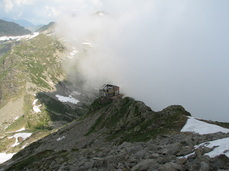 A few years ago there was a popular show on TV that described itself as being a show about nothing. Many of us were fans because of the hilarity of the situations in which the main characters found themselves. Most of the situations were exaggerations of ordinary events, but the show really had no plot line from week to week. In many ways it was a show about nothing, just as it was advertised. So I guess you could say that those of us who tuned in week after week enjoyed watching something that was really about nothing! Sounds like a huge waste of time. Maybe not. Regardless of one's feelings about that particular show or any other show on TV, the show was not really about nothing. It highlighted ordinary, day-to-day situations (albeit exaggerated) that we experience in our lives in such a way as to say nothing is really ordinary. I doubt the writers were trying to say anything really very profound, (they were trying to get us to laugh, maybe at ourselves), but in a way there is something profound about the ordinary. The ordinary is a blank canvas waiting for someone to create something beautiful on it. It is only ordinary as long as we let it be so. It is only a matter of perception as to what ordinary really is. What may seem ordinary and sort of "blah" or "hum-drum" is actually teeming with life! I may be in my daily routine thinking I am simply at the grind, so to speak, when in fact every interaction has the potential to change someone's life even for a moment. An example of this was when I was in a card store recently and I was remarking about the weather to the clerk. The man behind me found what I said so amusing that afterward he thanked me for making his day brighter! I had no idea that anyone was even listening to me, except the clerk, and yet it changed a bit of the other man's day. And in turn, it made me smile a bit more in recalling his pleasure at my silly statement. While this may not seem very profound, one can see God in it, if one looks a bit more deeply. God enjoys us and our funniness sometimes, too. (Oh, I am sure I amuse God a fair amount!) But in brightening someone's day, even if unintentionally, I think God is present. If I choose to perceive my participation in this day as unimportant, affecting no one, without purpose or affect, it may in fact be so. That is, to me it will be so. We have far more impact on people than we often realize, both for the good and for the ill. If we choose to see only a negative perspective, and choose to believe that our existence is unimportant and droll, then we will have missed scores of opportunities to realize that even small things make a difference in this world. On top of that, we will have missed some occasions of beauty which would go by unnoticed. If we choose to see each day as the potential for using our gifts, and we choose to see each day as full of the presence of God, then in fact we will come away with something that changes everything: deep gratitude and joy. 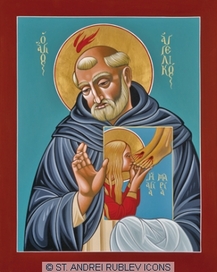 Seeing the day as full of possibilities and seeing the day as full of the presence of God is the attitude of a disciple. Disciples see their lives as full of possibility because they know they are on a mission. Even on the days when our schedules do not look overly exciting, each little act of seemingly unimportant routine is full of the presence of God and the possibility that what we are doing is affecting the outside world. The problem is that often we think that unless we are doing the equivalent of curing cancer or climbing Mt. Everest, we are not doing anything important. Most of us will never do those things, but we do have a huge impact on the lives of those who love us, and upon those whom we meet in the most ordinary circumstances. Often we do not pay attention to the people around us because we are either momentarily self-absorbed or absorbed in the task at hand. Maybe the challenge here for us is to try to learn to be a bit more attentive every day to those seemingly invisible people around us. In other words, we need to begin to see those other people around us, not as background filler, but as people whom we may affect just by being who we are, where we are. Maybe the challenge is to live truly as disciples; a disciple sees all things through the lens of the spiritual, through the lens of the Scriptures, which is ultimately the lens of seeing as God sees. God is so immensely loving that seeing with His eyes would filter out a lot of judgment, a lot of ugliness, and a lot of hatred, replacing it with acceptance, beauty and a broader love than we are ordinarily capable of having. A disciple is one who follows the Master. Our master is Jesus, the Lord of All. To see life as a gift is what He teaches us. But because it is a gift, every moment is precious and full of possibility for us to bring others to see His beauty and to know His love. It is a matter of perception. Nothing in life is really about nothing no matter how insignificant it may feel to us or no matter how insignificant we may feel. If we are feeling a little bored with our day-to-day reality maybe it is time to have an attitude tune-up. We just celebrated the Baptism of the Lord this past weekend. His baptism was not for the forgiveness of sins because He did not need forgiveness, being the perfect Son of God. Rather, Jesus was baptized to set an example for us; it marked the beginning of a new life for Him. Jesus came out of the obscurity of about 30 years of a hidden life. It was after His baptism that He began His ministry. If we are to be disciples, we need to realize that our baptism served this purpose also. Celebrating the Baptism of the Lord should make us think of our own baptism. If we are true disciples our baptism should be about our own ministry helping in the work of building the Kingdom of God. May this beginning of Ordinary Time be an immersion into the gift of discipleship, which we learn at the feet of the Master, Jesus! May Jesus help us to transform our perception of the time we have each day into a fruitful experience, realizing that we have the responsibility to share the Kingdom with others. May we see each moment of each day as the precious gift it is! And may we take the wonderful canvas of day-to-day life and let the Lord guide us in creating the beautiful work that is our life! May we understand that with eyes to see, nothing is ordinary at all! Let us continue to meet in the Heart of the Lord where He teaches us how to paint our beautiful canvas of daily life! Peace! -The top photo is one I took while climbing Mt. Mucrone in northern Italy a few years ago. I chose it because the cloud is obscuring the beautiful scenery below, an example of how easily our perception can be obscured by something as common as a little mist! -The second image is an icon of Bl. Fra Angelico, patron saint of artists. Maybe he can be our patron as we try to paint a beautiful portrait of God's love with this day. This icon was written by Rev. William Hart McNichols and can be found along with a small explanation of the life and work of Fra Angelico at http://www.standreirublevicons.com/gallery.php?action=viewPicture&id=49  I was just sitting down to Second Breakfast and began reflecting on a journey I have been making. Well, maybe not a true second breakfast, but I was reflecting all the same. It might be obvious by now that I reconnected with The Hobbit, which I read originally as a teenager and which has been popularized again due to a film depicting the first part of the book. The book is the beginning of the tale of how hobbits got involved with the One Ring of Power and sets up the story line of The Lord of the Rings. The book is not necessarily the subject I would like to reflect upon, nor is J.R.R Tolkien, but rather a thought that it evoked about the journey of life. We celebrated the feast of the Epiphany this past weekend, and this, too, is about people on a journey. I think there is a connection that can be made between the two. In The Hobbit, the protagonist, Bilbo Baggins, makes a sudden and altogether unexpected journey. He does not seek adventure, but when the adventure literally comes to his doorstep, (or rather into his hobbit-hole) he finds himself entering into it, all the while protesting to himself that he would rather be home. For most of us, home is a place of safety and security. It is a place where much of life is lived, but if we stay there and do not venture out into the uncertainty of the journey set before us, we would do more than miss out on a wonderful adventure: we would miss out on the lessons, and the gifts contained in them, that are so important to us. In short, we would miss opportunities to meet God in the people and situations we would come across. We would miss life itself. There are dangers in any journey. Just as Bilbo and the magi had to venture out of their safe, secure environments to their destinations so, too, we need to venture out to where God leads. While we often do not find hordes of gold at the end of our adventures, we do find treasure. One might notice that in The Hobbit Bilbo still has to get home after the adventure, hence the subtitle, "There and Back Again." No story ends with the one treasure found, or the one goal met, no matter how big the goal or the treasure, unless it is the final ending. That is, the goal is only met when we get to the end of our lives and are welcomed into the true destination, Heaven. The real treasure, Bilbo discovers, is not the horde of gold he has journeyed to “liberate.” It is the journey itself, in which he discovers qualities in himself that he did not know he possessed. It is in discovering friendships with people with whom he would never have chosen to associate. It is in discovering the beauty of the world through which the adventure takes him. It is in discovering the value of the things that really matter. These are inner things, such as the true heroism of selflessness, wisdom, compassion, mercy, love, and sharing all of these with family and friends. That is the horde with which he returns. The message of the journey of Bilbo Baggins is not at all a stretch from that of the journey of the magi. The magi also had to learn the value of the journey while on it. When they got to the destination, revealed to them by the star, they presented gifts in awe and in gratitude. But they received far more than they gave the Holy Family. They left having seen with their own eyes the King of Heaven come to earth. They were in the presence of Jesus, even if for a short time, an encounter which changed them forever. They left with belief and understanding which they did not have before they arrived. They witnessed the glory of God; they encountered God’s revelation in His Son. We can only imagine what happened in their minds and hearts. As for Bilbo, the writer tells us he was never the same either. As in the lives of the magi, there was a danger that loomed in the distance on his journey home. But he returned with much gratitude for the people he met and the lessons learned in the situations he experienced. Most of all, he returned with a heightened sense of love for family and friends. On the home journey Bilbo and the magi were not the same people as they were on the way to the supposed goal. They had more depth and more inner wealth. They learned much on the inbound journey through experience, which included both mistakes and successes. And they met the goal, which often is greater than anticipated, given all they had learned on the journey. Therefore, on the return (or outbound) journey they were more fully alive and came to a greater appreciation not only of the world around them, but of their call within it. There was a deeper sense of purpose, of gratitude, for all they had and all they had learned, and of the values that really mattered to them. Journey reveals to us what matters most to us in this life, especially when we come perilously close to losing it all. In the end we let go of everything and we embrace a new reality which is our relationship with God and the gift of love shared with Him and with the people He places in our lives.  This year the celebration of the Epiphany helped me reflect on what the Christmas Season revealed. What mattered most was the time spent with friends and family. The most beautiful moment was the gift of being with someone who was leaving this earthly journey for the ultimate destination of Heaven. As a result my reflection has been in knowing that life is a precious gift and it is a journey. Each moment is fleeting, but able to be savored. Each moment is full of possibility, a wealth of opportunity. Some moments may even contain a little danger since life can be unpredictable with variables that are out of our hands. But if we trust that the Lord of All Creation is with us on the journey throughout this life, then we know that the "there and back again" adventures of our lives are full of gift and insight, even if we get a few bruises and endure much suffering along the way. When we return home again, we can enjoy the second breakfast, the pipe and blowing of smoke rings, the warm hearth, and especially our dearest friends and family, that much more. We even might enjoy a "fish-tale" or two, but always in the perspective that it is all Gift. The journey does not end at our earthly dwelling however, no matter how cozy our personal "hobbit-hole" may be. Like Bilbo, the journey goes ever on. We are not fully at home until we are home with our Father in Heaven. But while here, we should never lose our "wanderlust" because our ultimate journey is still in progress. In truth the journey is an inner one, not necessarily one in which we pack our ponies (or camels, whatever the case may be) and go through the woods and over hill and dale. It is a journey with and to God. That is the beauty of it. He comes with us on our journey! He may be in disguise sometimes, but He is there guiding, protecting, comforting, and teaching. But unless we leave the comfort zone of our dwellings, so to speak, we will not find the true richness we find in Him on this journey. The epiphany is what happens on the way home. And it is oh, so beautiful! May we have the courage to make the journey of life, knowing that it reveals many truths and bears many gifts! May we have the courage to make the inner journey which is the truest journey, home to where the Lord dwells in the depths of our heart! May we have a growing sense of gratitude for all those loved ones who are our true treasures and who bear the greatest gifts offered to us from God! And may we know we are never alone because we are accompanied from start to finish by the One Whom We Seek! May we continue to meet at the foot of the Manger, with the Holy Family during the remainder of this season of Christmas! Joyous Journeying! Peace! Photos: I took the top one in Ireland on a typical Irish morning in which the mists were just starting to dissipate. This is a tip of my hat to the Misty Mountains of The Lord of the Rings. The second photo is a reminder to stop and smell the roses! :) 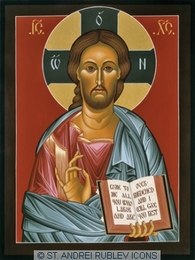 Like many of us, I enjoy a good movie every now and again. Most of the time I am not really eager to see a film as soon as it hits the big screen, but this year there was a great exception because my favorite piece of literature, well-hyped I admit, was coming to a theater near me. I have seen every version of Victor Hugo's Les Misèrables that exists and I have read the book cover to cover three times. While few productions are ever as good as the original book, this one was the best version of Les Misèrables I have seen. There is no accounting for taste, so my point is not to debate this film versus other films, stage productions, etc., and I do not intend this to be a critique of the film. I am simply stating the fact that I loved the film based on the book, which happens to be my favorite book of all time. The story revolves around an act of mercy that is thoroughly undeserved by the recipient, Jean Valjean. Because of this one act, Valjean's life is changed forever. He learns to be just, compassionate, other-centered, forgiving, and merciful: in a word, loving. He learns all of this, but not in the moment of the act of mercy he experiences. Rather it happens over a period of 20 years, most of it off screen (if you are seeing it on film.) It would be easy to leave the description at that, but upon reflection there is much, much more to it. First of all, what got this man in trouble in the first place was an act of mercy he attempted, but which broke the law. Valjean tried to steal a loaf of bread for his starving nieces and nephews (of whom there were seven!) and their impoverished mother. Stealing is clearly wrong, but as the story is set up in the book, he was desperate after working hard at various jobs such as a tree pruner and a harvester, and still could not feed all those hungry children. He was trying to save them from starvation. He paid the price, but it was overly harsh: he was sentenced to five years of living hell, which ended up being nineteen due to the brutality of the situation and an escape attempt. The society he lived in was so out of balance that a good man committed a crime in order to save his family. Maybe we can realize that not all people who commit crimes are bad people. They could, in fact, be good people who made a bad choice, or even good people who were thrust into circumstances so horrific that they saw no other way. It certainly ought to challenge us about whom we judge. Scripture says that unless we know all the circumstances, and surely God is the only one that knows this, (which includes a person's heart), we cannot judge. That is not our "job," but the job of God alone. After all, we are all guilty of something, namely sin. Therefore, the act that led Valjean to prison was an attempt at selflessness. He did not steal for himself or simply to steal. Though wrong, he stole in an attempt to help others. When on trial, he tried to rely upon the mercy of the court, but rather than to help him and people like him, the government was set up for him to pay an exorbitant price. The punishment did not fit the crime: it was far worse. He was set up to fail. The only way to survive in the prison conditions was to become hardened. He sought mercy and found none. Therefore when Valjean finally received mercy, (though he really did not deserve it due to his actions), it completely changed his life. Upon reflecting on this, it made me realize how one act of mercy can be life changing for a person. And further, mercy is not about what a person deserves. Throughout Les Misèrables, there were acts of mercy enacted by Valjean and all of them had great impact upon the recipients. He had mercy upon a lowly factory worker turned prostitute, another good person who was desperately trying to help her child. He treated those around him with mercy because he truly learned mercy’s power. I do not want to say more about the plot so as not to ruin it for anyone unfamiliar with it, but the entire book/film revolves around that one act of mercy he received which was like a pebble dropped into a pond: it formed concentric rings of mercy which moved outward in wider and wider circles affecting many lives. 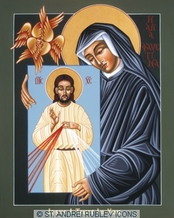 Maybe we can be challenged to have mercy on those around us, letting mercy flow outwards like that pebble in a pond. Our world seems to be lacking mercy in so many areas right now. When someone cuts us off on the freeway, maybe the merciful thing is not to retaliate or to let the person know of our ire. Maybe mercy is in helping a poor friend, relative, or especially a stranger. Rather than judging why a person is without a job or homeless, even if we know there is lack of effort on their part, maybe we can do something to help get that person headed in a better direction, or give to organizations that help. Maybe we can be merciful when someone wrongs us by forgiving them. If the person does not change his or her ways and is potentially still hurtful to us, maybe avoiding them is the way to go, but without gossiping or spreading stories about them in the process. What made Jesus so remarkable were His constant acts of mercy. They were not limited to certain people or types of people. He had mercy on everyone, especially those who hated Him and those who made Him suffer. Jesus is the Son of God, so we should realize that this is also the way of the Father. God would much rather be merciful to us than to judge us and find us guilty of anything. He offers us mercy over and over. All we, (as undeserving as Valjean), have to do is accept it. If we seek out God's mercy and forgiveness we will find it. God tells us repeatedly in the Scriptures that He wishes to give us mercy, not condemnation. The Old Testament is all about that. And the ultimate act of mercy, even when we continually pushed God away, was to send His Son. We did not deserve the Incarnation, we did not deserve the salvation given us by His death and resurrection, and we do not deserve the countless graces we continue to receive. We deserve none of it! So why did Jesus do all this for us? Why does God continually give us things we do not deserve? He does this because it is not about what we deserve: it is about the nature of Love, which is who God is. It is about the fact that God sees us as His beautiful children. He gifts us with everything because He loves us. When we are selfish, ungrateful, oblivious of Him and His love, or even unmerciful to someone else, God is ready to forgive us and give us more gifts! He does the opposite of what our inclination might be. That is because of who He is. God is Love...and thank God for that. Read the story of the woman caught in adultery in the Gospel of John, chapter 8. Jesus forgave the woman and never judged her, though He did tell her not to do the sin again. We should never worry about our worthiness, or lack thereof, when we approach the Father. We should never let our feelings of unworthiness keep us from Him. If it was about that, none of us would ever dare approach Him, and that is the opposite of what God desires. He wants a personal relationship with each of us; He desires intimacy with us. He wants to lavish us with gifts of His love. This is the "secret" that Jean Valjean knew. It is what he learned with that one act of mercy he received, which was in imitation of the great mercy given us by God. May we learn the secret of being merciful by recognizing the great mercy given to us on a daily basis by our loving Father, God of All Creation! May we ask for and receive the grace of putting mercy into action in our lives so that we may teach mercy to those around us! May mercy take root in our homes, communities, and nation, as it is the one thing that will save us from destruction! May we continue to meet in the Merciful Heart of so great a Lord who is Love! Peace! The icon at the top is Christ All Merciful written by Rev. William Hart McNichols and can be found at http://www.standreirublevicons.com/gallery.php?action=viewPicture&id=54 The second icon is St. Faustina Apostle of the Divine Mercy is also by Rev. William Hart McNichols and can be found at http://www.standreirublevicons.com/gallery.php?action=viewPicture&id=158 |
Heart Speaks to Heart
|

 RSS Feed
RSS Feed

